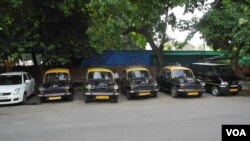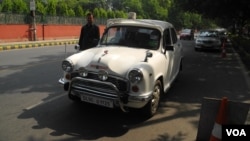NEW DELHI —
The oldest car to be made in India, the iconic Ambassador, withstood competition from newer and sleeker rivals for several decades, but it seems to have finally been edged out. The production of the car has been suspended and many fear it is not likely to make a comeback.
For taxi driver Balvinder Singh, there was never a question of buying any car besides the Ambassador to ferry his customers around the Indian capital.
Everyone likes it, Singh said. It is a very comfortable car. He has driven only the Ambassador for 50 years.
No wonder he was overcome with sadness when Hindustan Motors company announced that it is halting the car’s production until further notice due to weak demand and lack of funds.
Singh is not the only one. A wave of nostalgia swept the country on learning that the Ambassador, inspired by Britain’s Morris Oxford, may be on its way out.
Since 1958, when the first Ambassador was produced, until the mid-1980s, the snub-nosed, boxy car was the undisputed leader of Indian roads.
With a red beacon on top, it proudly ferried prime ministers and dignitaries. Affectionately known as the “Amby,” it was the favorite family vehicle. Its stodgy steel body negotiated difficult hill terrain and withstood potholed roads in towns and cities without a whimper.
Competition arrived in the mid-1980s when a Japanese car maker, Suzuki, collaborated with an Indian company to produce an affordable compact car, the Maruti. But the Ambassador still retained its status as the car of the elite and the powerful until 1991, when India liberalized its economy and a host of global auto giants drove in offering consumers sleek, fuel-efficient vehicles. Some sold compact cars, others tempted a rising middle class with glitzy, luxury models or muscular SUVs.
The lumbering Ambassador found it increasingly difficult to hang on to customers in a country that had grown younger and more aspirational.
Diksha Pande, a young professional in New Delhi, has fond memories of an orange and brown Ambassador her grandfather possessed. But she has never thought of buying the Amby, which she considers an automobile relic.
“They are a bit retro, so they feel a little outdated, and I don’t think they will have the same amount of power and swiftness that you want in a car in today’s day and age. I like SUVs because they are big powerful cars. And power is important in a car,” said Pande.
Still, the Ambassador tenaciously stuck by its unique old-world body design. For nearly six decades, it managed to cling on, helped by the government, which continued to patronize it until a decade ago. So did many taxi drivers - it was cheap on repairs. It was even ranked the best taxi by BBC’s Top Gear television show.
But the car’s sales steadily dipped. Last year only 2,200 vehicles were sold - a tiny slice of the 1.8 million cars sold in the country.
Yogendra Pratap, editor of AutoBild magazine, said the Ambassador was facing problems for some years. Its engine was not compatible with newer emission standards. He said the end was inevitable once Indian officials began opting for other cars.
“The Ambassador carried on for too much of a time with the same technology, not investing in the product. Also being a fuel guzzler it was not the first choice for either the bureaucrats, or the army and other government agencies who were sticking on to the Ambassador,” said Pratap.
A top official at the Society of Indian Automobile Manufacturers, Sugata Sen, said although Indians may have deserted it, the Ambassador is a quintessential part of the lives of millions of families.
“When we were growing up, Ambassador was the only car we had. So there is a lot of sentimental value attached to the vehicle. Suddenly if the vehicle stops, it will be a loss to our whole society,” said Sen.
At cab stands, which have continued to patronize the Ambassador, there is a sense that an era is passing by. In a country with a high rate of road accidents, taxi driver Manjit Singh said he always felt safe in it. Foreigners enjoyed travelling in it. Singh is really attached to the Ambassador.
He SAID his parents and grandparents earned a living by driving an Ambassador, and now it is being abandoned. Singh said he feels very bad, but understands that little can be done.
He is probably right.
There has been some talk of finding an investor for the car, but auto experts doubt whether it will be viable for India’s Amby to make a comeback.
For taxi driver Balvinder Singh, there was never a question of buying any car besides the Ambassador to ferry his customers around the Indian capital.
Everyone likes it, Singh said. It is a very comfortable car. He has driven only the Ambassador for 50 years.
No wonder he was overcome with sadness when Hindustan Motors company announced that it is halting the car’s production until further notice due to weak demand and lack of funds.
Singh is not the only one. A wave of nostalgia swept the country on learning that the Ambassador, inspired by Britain’s Morris Oxford, may be on its way out.
Since 1958, when the first Ambassador was produced, until the mid-1980s, the snub-nosed, boxy car was the undisputed leader of Indian roads.
With a red beacon on top, it proudly ferried prime ministers and dignitaries. Affectionately known as the “Amby,” it was the favorite family vehicle. Its stodgy steel body negotiated difficult hill terrain and withstood potholed roads in towns and cities without a whimper.
Competition arrived in the mid-1980s when a Japanese car maker, Suzuki, collaborated with an Indian company to produce an affordable compact car, the Maruti. But the Ambassador still retained its status as the car of the elite and the powerful until 1991, when India liberalized its economy and a host of global auto giants drove in offering consumers sleek, fuel-efficient vehicles. Some sold compact cars, others tempted a rising middle class with glitzy, luxury models or muscular SUVs.
The lumbering Ambassador found it increasingly difficult to hang on to customers in a country that had grown younger and more aspirational.
Diksha Pande, a young professional in New Delhi, has fond memories of an orange and brown Ambassador her grandfather possessed. But she has never thought of buying the Amby, which she considers an automobile relic.
“They are a bit retro, so they feel a little outdated, and I don’t think they will have the same amount of power and swiftness that you want in a car in today’s day and age. I like SUVs because they are big powerful cars. And power is important in a car,” said Pande.
Still, the Ambassador tenaciously stuck by its unique old-world body design. For nearly six decades, it managed to cling on, helped by the government, which continued to patronize it until a decade ago. So did many taxi drivers - it was cheap on repairs. It was even ranked the best taxi by BBC’s Top Gear television show.
But the car’s sales steadily dipped. Last year only 2,200 vehicles were sold - a tiny slice of the 1.8 million cars sold in the country.
Yogendra Pratap, editor of AutoBild magazine, said the Ambassador was facing problems for some years. Its engine was not compatible with newer emission standards. He said the end was inevitable once Indian officials began opting for other cars.
“The Ambassador carried on for too much of a time with the same technology, not investing in the product. Also being a fuel guzzler it was not the first choice for either the bureaucrats, or the army and other government agencies who were sticking on to the Ambassador,” said Pratap.
A top official at the Society of Indian Automobile Manufacturers, Sugata Sen, said although Indians may have deserted it, the Ambassador is a quintessential part of the lives of millions of families.
“When we were growing up, Ambassador was the only car we had. So there is a lot of sentimental value attached to the vehicle. Suddenly if the vehicle stops, it will be a loss to our whole society,” said Sen.
At cab stands, which have continued to patronize the Ambassador, there is a sense that an era is passing by. In a country with a high rate of road accidents, taxi driver Manjit Singh said he always felt safe in it. Foreigners enjoyed travelling in it. Singh is really attached to the Ambassador.
He SAID his parents and grandparents earned a living by driving an Ambassador, and now it is being abandoned. Singh said he feels very bad, but understands that little can be done.
He is probably right.
There has been some talk of finding an investor for the car, but auto experts doubt whether it will be viable for India’s Amby to make a comeback.





